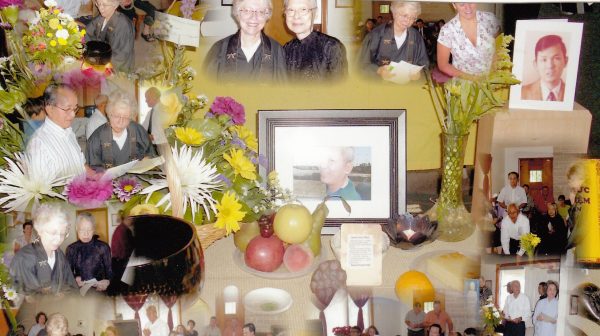I’m Reverend Virginia Parkum, Osho, a priest with the Blue Mountain Lotus Society, a Buddhist Temple in Harrisburg. In 2004 we received a call from the Harrisburg State Hospital, a mental health facility, that one of their residents, Hanh Ngo, had requested visits from a Buddhist minister. I volunteered to go.
The staff said Mr. Hanh did not speak English, but a translator would be provided. He had ended up at the State Hospital after being part of the hasty Saigon evacuation when he was a very young adult, alone. I knew there were several varieties of Vietnamese Buddhism, with different ways of holding services. I just decided to put together a simple devotional liturgy, with a printed reading in Vietnamese and a recorded Buddhist chant, also in Vietnamese. I brought along a bell, a metal bowl that sits on a circular cushion that is tapped with a wood stick in rhythm with the chant, and a small wooden drum also used in chanting. I didn’t know if he would be allowed to use either of them, or the Vietnamese incense I’d found at an Asian grocery store, or the flowers in a small vase, or the bowl with water, all part of any Buddhist altar setting.
 After going through security and wandering down long busy hallways, I found the designated room. There were more people than I’d expected, all seated at a long conference table. There were two translators, a social worker, several members of the Hospital staff team, and Mr. Hanh. I wore the traditional long black robe and stole of my temple. The incense was not OK, but everything else was. Mr. Hanh helped arrange the altar space at one end of the table and sat down with the liturgy and bell and drum. With a “gongggg” from the bell I started the chant, and he soon joined in. After about 10 minutes, one of the translators felt we should move on to something rather than the “music.” Nobody other than Mr. Hanh and I were Buddhist, and I explained that a Buddhist service in a home setting often was the chant itself; the chanting was the service, not background music. In 25 minutes the chant and spoken part of the recording concluded, we bowed, as is customary, and Mr. Hanh was taken back to his room, with a copy of the sutra he’d chanted. I left the chant CD with his staff helpers, hoping it would be OK for him to play it in his room.
After going through security and wandering down long busy hallways, I found the designated room. There were more people than I’d expected, all seated at a long conference table. There were two translators, a social worker, several members of the Hospital staff team, and Mr. Hanh. I wore the traditional long black robe and stole of my temple. The incense was not OK, but everything else was. Mr. Hanh helped arrange the altar space at one end of the table and sat down with the liturgy and bell and drum. With a “gongggg” from the bell I started the chant, and he soon joined in. After about 10 minutes, one of the translators felt we should move on to something rather than the “music.” Nobody other than Mr. Hanh and I were Buddhist, and I explained that a Buddhist service in a home setting often was the chant itself; the chanting was the service, not background music. In 25 minutes the chant and spoken part of the recording concluded, we bowed, as is customary, and Mr. Hanh was taken back to his room, with a copy of the sutra he’d chanted. I left the chant CD with his staff helpers, hoping it would be OK for him to play it in his room.
Over the following months I visited the Hospital several more times, and Mr. Hanh was also brought to our Temple. Here he could light that Vietnamese incense, choose to sit on a chair or on the floor on a meditation cushion, as he may have done back in Vietnam, and have some Vietnamese food from a local restaurant…candy too!
Some wonderful things happened. The staff said Mr. Hanh looked more cheerful when he walked around the hospital grounds. A Temple member who had flown helicopters in the war and was now very committed to learning about Vietnam and reconciling past and present, used his connections and those of Vietnamese friends and a Vietnamese social worker to help re-establish contact with Mr. Hanh’s family in Vietnam. Eventually a phone connection was set up with the village where they lived, using a neighbor’s phone as the family had none, and he got to speak with his family after so very many long years. They deeply wanted their brother to return home to live. Work was begun to help him return, a slow process involving all the necessary papers and funds and the problems of setting up care for him in his home village. While this was slowly proceeding, the State Hospital was closed. Mr. Hanh was moved to a suburban Harrisburg group home.
Mr. Hanh eventually returned home, but not in the hoped for way. He died in August, 2007, at the age of 51. I was asked to lead the funeral service. It was set up at his group home, his residential family attending and also a number of members of the area Vietnamese community. They set up a traditional altar area with his photograph, an array of fruit and flower offerings, and food after the service. As at the beginning, I put together a short liturgy of Vietnamese chants and this time readings in English, too, and his group home family joined in. Mr. Hanh’s ashes went with me to our Temple, where he had once visited and chanted and lit incense. They stayed by the altar until being sent home to his family in Vietnam.
Virginia Parkum, Osho, Ph.D.
The Blue Mountain Lotus Society, Harrisburg, PA

